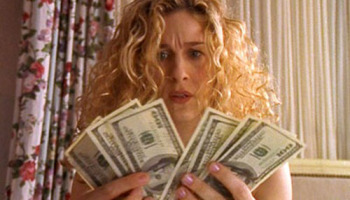
We need to stop telling women they’re bad with money
There’s an episode of Sex And The City in which Carrie gets her credit card cut in half while trying to buy a pair of shoes (I think she’s in Dolce & Gabbana).
As the cashier is wielding the scissors, a friend happens to walk into the shop and, with a tinkling laugh, hands over her wealthy boyfriend’s plastic. Carrie is still in the red, but she has brand new $400 shoes, and no imminent consequences to worry about.
Being in debt isn't glamorous

When I saw this scene, I was 13 - really, far too young to be watching SATC. In some ways, the program had a great influence on me, and I think it promoted confidence, ambition and a positive attitude towards sex. But it also made me think that there was something glamorous about funding your life with credit cards, that it was common to be in tons of debt and that when spoiled white women really, really want something they’ve seen in a shoe shop, it’s OK to let lust trump sense.
So when I bought shoes that I didn’t need with a credit card for the first time (Accessorize, pale blue suede with a pearl button) I thought “ZOMG! Just like Carrie!” When that credit card got declined for the first time I felt slightly sick, but I also giggled and said “Hahahaha, I’m so bad with money!”
“If I laughed it off as a girly quirk, I could pretend I wasn’t lying awake at 4am wondering when the bleak reality of my situation was going to swallow me whole. ”
Being broke was a charming quirk, and it would be fixed as soon as someone decided to give me a job with a six figure salary after spotting me on the street and falling in love with me and my handbag.
Now, thanks to a combination of hindsight, shame and the very real mental health issues that occur when you deal with debt, I am aware that my early twenties Manic Plastic Melting Dream Girl act was a noxious expression of privilege. When I was a student, I had an enormous amount of financial support from my parents. I was surrounded by people who were getting into debt to pay for rent, food and course books while I made the (bad) choice to spend money that wasn’t mine on dodgy designer sunglasses I found on Ebay.
But when I graduated and worked in a series of jobs with salaries that didn’t quite cover my rent and bills, I clung to the “bad with money” label. If I laughed it off as a girly quirk, I could pretend I wasn’t lying awake at 4AM wondering whether I’d ever pay off my debt and earn enough money to live on, and when the bleak reality of my situation was going to swallow me whole.
We're not "bad with money"
Last year, US writer and comedian Gaby Dunn launched her podcast Bad With Money. I was gripped from the first episode - the name of the show had been my mantra for so long, it was as if Dunn had been inside my brain when I was lying awake at night.
Dunn, half-jokingly, describes herself as “America’s deadbeat sweetheart”. She talks about issues from the psychology of money management, to growing up with parents in debt and dealing with the problem of trying to get paid for creative work, and being in an industry where that payment often comes in the form of “exposure”.
The point Dunn makes, over and over again, is that many of us feel as though we’re “bad with money” when we’re trapped by a system that doesn’t value us while telling us that not having enough money is a moral issue. In an early episode, Dunn asks people (both men and women) their favorite sex position – information they’re happy to volunteer – and then their current bank balance. They clammed up. Money is a source of fear, shame and anxiety.
“Maths is a feminist issue ”
- Shirley Conran
Dunn also considers the fact that many of us grew up in households where men are the ones who earned money and took care of it. The guests whose mothers worked and understood money and budgeting tended to have a healthier relationship with their own finances. We can’t be what we can’t see - when women don’t have a strong financial role model, it’s much harder to accept that we need to take responsibility for money management.
The author Shirley Conran has written a course to get young women interested in maths and money, after struggling to support her family after her divorce. As a child, she was told “ladies never have anything to do with money”, so she taught herself to understand it. She explains “I then wrote a book about all the things I’d done wrong — so other women could avoid doing them” adding “maths is a feminist issue."
It's not boring to know what we're worth
Using the label bad with money allowed me to avoid facing my fears and dealing with my problems. But it’s a label that is dangerously sticky. Because it’s a stereotype we often apply to women, no-one around me was challenging me or holding me accountable for my money mess. It affects all areas of our financial lives.
The expensive things that men buy are talked of as “investments”. When women buy something expensive, we’re “treating” or “spoiling” ourselves. If we’re so quick to brand ourselves bad with money, how can we understand what our payslips mean and more importantly, challenge the numbers when they’re lower than our male counterparts? For too long, we’ve swallowed the message that finance isn’t for us, and it’s OK to let it go over our heads.
There are people who want women to believe that maths and money are boring topics. But it’s not boring to know what we’re worth, and get paid properly. It’s not boring to be able to plan our futures. It’s not boring to be in control. It is boring to believe that our gender could have a detrimental effect on how we approach our finances.



